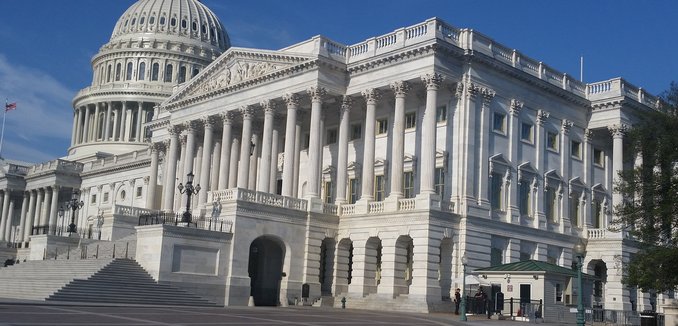Two United States senators pushed back on Thursday, against charges made by the American Civil Liberties Union (ACLU) that a bill designed to fight boycotts of Israel violates the Constitution.
Contrary to charges raised by ACLU National Political Director Faiz Shakir, the Israel Anti-Boycott Act does not “punish U.S. persons based solely on their expressed political beliefs,” Sen. Ben Cardin (D – Md.), chief sponsor of the legislation, and Sen. Rob Portman (R – Ohio) observed in an open letter.
The law simply extends existing laws barring participation in foreign govt sponsored boycotts to include those sponsored by Intl orgs. https://t.co/D4dVjHttOa
— Eugene Kontorovich (@EVKontorovich) July 19, 2017
The senators explained that the bill only expands an existing law against complying with a boycott of an American ally at the behest of a foreign government, namely by also restricting participation in such boycotts if they are imposed by international governmental organizations, such as the United Nations.
The bill would not outlaw a company or individual from deciding on their own to boycott any American ally, including Israel.
While the ACLU letter falsely charged that the bill “would impose civil and criminal punishment on individuals solely because of their political beliefs about Israel and its policies,” in truth, the “bill does not prevent U.S. companies and individuals from expressing their points of view, speaking in favor of boycott, divestment, or sanctions (BDS) activities, engaging in boycott activity of their own accord, or being critical of Israel,” Cardin and Portman wrote.
Individuals who “actively avoid purchasing goods and services” because of their own political viewpoint would not be subject to the bill. Similarly, the bill does not regulate civil society organizations who are critical of Israeli policies or prevent them from speaking in favor of BDS. The legislation does not encourage or compel persons to do business with Israel, nor does it punish individuals or companies from refusing to do business with Israel based on their own political beliefs, for “purely pragmatic reasons,” or for no reason stated at all. Any suggestion that this bill creates potential criminal or civil liability for these actions is false.
The Israel Anti-Boycott Act is an extension of existing legislation outlawing participation in the Arab League boycott of Israel. As part of its authority to regulate commerce, Congress has been granted latitude by the courts in legislating against anti-Israel boycotts.
Implosion of a once-honorable organization. Part of the self-destruction came from hiring BDS activists. https://t.co/JFupwJmesZ
— NGO Monitor (@ngomonitor) July 20, 2017
The ACLU’s misleading criticism of the legislation comes shortly after the director of its Human Rights Program, Jamil Dakwar, accused Israel’s government of exploiting anti-Semitism and argued that anti-Zionism was not linked to anti-Semitism—a position rejected by senior Jewish leaders and diverse public figures including former British Chief Rabbi Jonathan Sacks, Anti-Defamation League CEO Jonathan Greenblatt, Pope Francis, Minority Leader Sen. Chuck Schumer, French President Emmanuel Macron, and Secretary-General of the UN António Guterres.
In 2012, when Shakir headed the Center for American Progress, the organization came under fire when one of its bloggers used the term “Israel-firster”—a term that Shakir himself acknowledged had anti-Semitic connotations.
[Photo: Flickr]




